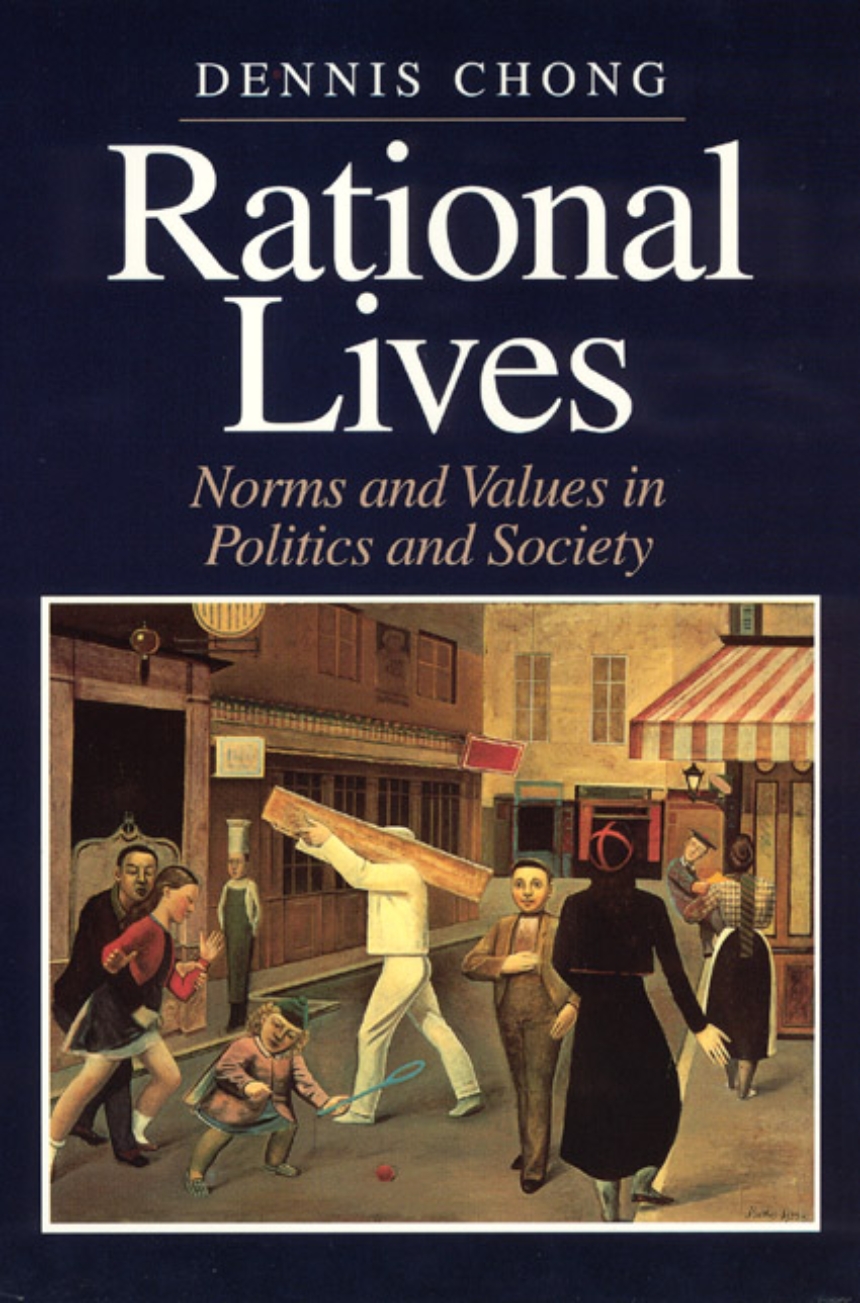Rational Lives
Norms and Values in Politics and Society
Those who study value conflicts have resisted rational choice approaches in the social sciences, contending that political conflict over cultural values is best explained by group loyalties, symbolic motives, and other "nonrational" factors. However, Chong shows that a single model can explain how people make decisions across both social and economic realms. He argues that our preferences result from a combination of psychological dispositions, which are shaped by social influences and developed over the life span.
Chong’s book yields insights about the circumstances under which preferences, beliefs, values, norms and group identifications are formed. It offers a provocative explanation of how ingrained social norms and values can change over time despite the forces maintaining the status quo.
"Going beyond the tired polemics on both sides, [Chong] constructs a new interpretation of human behavior in which culture and individual rationality both matter. The synthesis is a more comprehensive and powerful explanatory framework than either side could have produced, and Chong’s creativity should influence subsequent interpretations of our social life in fundamental ways."—Christopher H. Achen, University of Michigan
Chong’s book yields insights about the circumstances under which preferences, beliefs, values, norms and group identifications are formed. It offers a provocative explanation of how ingrained social norms and values can change over time despite the forces maintaining the status quo.
"Going beyond the tired polemics on both sides, [Chong] constructs a new interpretation of human behavior in which culture and individual rationality both matter. The synthesis is a more comprehensive and powerful explanatory framework than either side could have produced, and Chong’s creativity should influence subsequent interpretations of our social life in fundamental ways."—Christopher H. Achen, University of Michigan
299 pages | 9 line drawings | 6 x 9 | © 2000
American Politics and Political Economy Series
Political Science: Political Behavior and Public Opinion
Table of Contents
List of Figures
Acknowledgments
Introduction
1. Interests versus Values
Rational Choice
Status Politics
Symbolic Politics
Does Rational Choice Theory Survive the Challenges Posed by the Symbolic Politics Research?
Taking Stock of Expressive and Instrumental Theories
2. A Model of Individual Choice
Dispositions and Incentives
Reference Groups and Conformity
Group Dynamics
A Model of Individual Choice
Incentives: The Meaning of Pi
Reinforcing Only L
Reinforcing Only R
Dispositions: The Meaning of a and b
Exposure to Both L and R
Deductions: The Interplay between Incentives and Dispositions
Conclusion
3. Coordination and Conflict
Four Mechanisms of Defense
Coordination Problems
Ethnocentrism
Vested Interests
Majorities and Minorities
Conclusion
4. Cultural Mobilization
Creating Common Frames of Reference
Deductions
General Strategies
The Element of Surprise
Convergence on a Focal Point
Arguing with Principles
Conclusion
5. Economics Meets Morality in a Texas Community
Background
Setting the Agenda
Framing Strategies following the First Vote
Completing Worldviews
The Role of Social and Moral Beliefs in Solving Coordination Problems
Morality, Trust, and Social Order
Political Repercussions of Cultural Diversity
Evaluating Information and Reasoning about Means and Ends
Are the Citizens of Williamson County Acting in Their Self-Interest?
Conclusion
6. Mass Adjustment to New Norms
Incentives and Dispositions (Reprised)
Social Adjustment to New Norms and Practices
A Model of Social Adjustment
Mechanisms of Social Change
How the South Was Won
Conclusion
7. Culture and Strategy
A Unifying Theory
Value Formation
Social Change
The Limits of Rationality
Expressive and Moral Action
A Final Word
Notes
Bibliography
Index
Acknowledgments
Introduction
1. Interests versus Values
Rational Choice
Status Politics
Symbolic Politics
Does Rational Choice Theory Survive the Challenges Posed by the Symbolic Politics Research?
Taking Stock of Expressive and Instrumental Theories
2. A Model of Individual Choice
Dispositions and Incentives
Reference Groups and Conformity
Group Dynamics
A Model of Individual Choice
Incentives: The Meaning of Pi
Reinforcing Only L
Reinforcing Only R
Dispositions: The Meaning of a and b
Exposure to Both L and R
Deductions: The Interplay between Incentives and Dispositions
Conclusion
3. Coordination and Conflict
Four Mechanisms of Defense
Coordination Problems
Ethnocentrism
Vested Interests
Majorities and Minorities
Conclusion
4. Cultural Mobilization
Creating Common Frames of Reference
Deductions
General Strategies
The Element of Surprise
Convergence on a Focal Point
Arguing with Principles
Conclusion
5. Economics Meets Morality in a Texas Community
Background
Setting the Agenda
Framing Strategies following the First Vote
Completing Worldviews
The Role of Social and Moral Beliefs in Solving Coordination Problems
Morality, Trust, and Social Order
Political Repercussions of Cultural Diversity
Evaluating Information and Reasoning about Means and Ends
Are the Citizens of Williamson County Acting in Their Self-Interest?
Conclusion
6. Mass Adjustment to New Norms
Incentives and Dispositions (Reprised)
Social Adjustment to New Norms and Practices
A Model of Social Adjustment
Mechanisms of Social Change
How the South Was Won
Conclusion
7. Culture and Strategy
A Unifying Theory
Value Formation
Social Change
The Limits of Rationality
Expressive and Moral Action
A Final Word
Notes
Bibliography
Index
